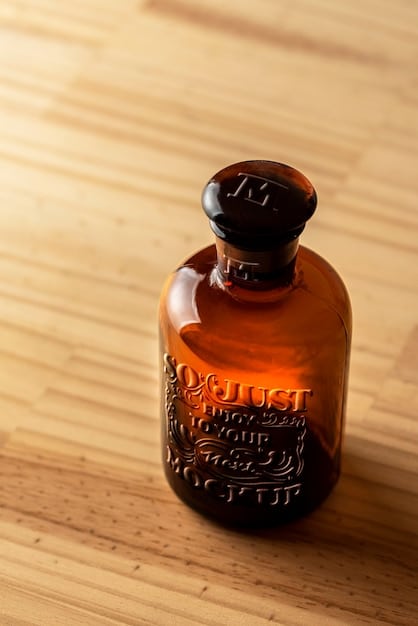The Role of Perfume in German Culture: Traditions and Etiquette

Advertisements
Perfume in German culture is more than just a fragrance; it’s a reflection of history, social etiquette, and personal identity, with distinct traditions shaping its usage and appreciation across generations.
The allure of fragrance has captivated individuals across cultures for centuries, and Germany is no exception. The Role of Perfume in German Culture: Traditions and Etiquette is a nuanced story, reflecting shifts in societal norms, personal expression, and historical influences. From classic scents to modern olfactory trends, perfume holds a unique place in the hearts and minds of Germans.
Advertisements
The History of Perfume in Germany
The history of perfume in Germany is intertwined with the broader European narrative, but it carries its own distinct characteristics. From early apothecaries to the rise of modern perfumeries, the evolution of fragrance in Germany tells a compelling tale of craftsmanship, innovation, and cultural adaptation.
Early Perfume Makers in Germany
The origins of perfume making in Germany can be traced back to apothecaries and monasteries, where fragrances were often created for medicinal or religious purposes. These early perfumers laid the groundwork for the development of more sophisticated techniques and formulations.
Advertisements
The Rise of Eau de Cologne
One of the most significant contributions to the world of fragrance is Eau de Cologne, which originated in Cologne, Germany. This light, refreshing scent quickly gained popularity and became a staple in households across Europe. Its creation marked a turning point in the history of German perfumery.

Here are some important milestones in the rise of Eau de Cologne:
- 1709: Johann Maria Farina establishes his fragrance business in Cologne, creating the original Eau de Cologne.
- 18th Century: Eau de Cologne gains popularity among European aristocracy and becomes a symbol of luxury.
- 19th Century: Numerous imitations and variations of Eau de Cologne emerge, solidifying its place in perfume history.
The development and popularity of Eau de Cologne significantly shaped the perfume landscape in Germany, influencing subsequent generations of perfumers and establishing Cologne as a key center for fragrance innovation. Its legacy continues to be celebrated today.
The Evolution of German Perfume Preferences
Over the years, German perfume preferences have evolved, influenced by factors such as fashion trends, cultural shifts, and technological advancements. Understanding these changes provides valuable insight into the role of fragrance in German society.
Classic German Perfumes
Several classic perfumes have maintained their popularity in Germany for decades, representing a sense of tradition and timeless elegance. These fragrances often evoke memories and emotions, contributing to their enduring appeal.
Modern Trends in German Perfume
In recent years, German perfume consumers have shown an increasing interest in niche fragrances, natural ingredients, and sustainable practices. This reflects a broader trend towards individuality and environmental consciousness.
Some key trends shaping modern German perfume preferences include:
- Niche Fragrances: Unique and artisanal scents that offer a departure from mainstream perfumes.
- Natural Ingredients: Perfumes formulated with essential oils and botanical extracts.
- Sustainable Practices: Brands committed to ethical sourcing, eco-friendly packaging, and reduced environmental impact.
These evolving preferences demonstrate a growing desire for authenticity, quality, and responsibility in the world of fragrance, influencing the market and driving innovation among German perfumers.

Perfume Etiquette in Germany
In Germany, as in many cultures, there are unwritten rules and customs surrounding perfume usage. These guidelines help ensure that fragrance is appreciated as a personal enhancement rather than a social disruption.
Occasions and Perfume Choices
The choice of perfume in Germany often depends on the occasion. Lighter, fresher scents are typically favored for daytime wear, while richer, more complex fragrances are reserved for evening events.
Dos and Don’ts of Perfume Application
Applying perfume in Germany involves a certain level of restraint and consideration. Over-application is generally frowned upon, as is wearing overpowering scents in enclosed spaces. It’s better to apply perfume lightly on pulse points.
Here’s a quick etiquette guide:
- Do: Apply perfume sparingly, focusing on pulse points like wrists and neck.
- Don’t: Over-apply perfume, especially in enclosed spaces like offices or public transportation.
- Do: Choose lighter, fresher scents for daytime wear.
- Don’t: Wear overpowering fragrances to events where strong scents may be inappropriate, such as hospitals or places of worship.
Following these guidelines helps maintain a pleasant and respectful olfactory environment, ensuring that perfume enhances rather than detracts from social interactions.
The German Perfume Industry Today
The German perfume industry is a dynamic sector, encompassing both established brands and emerging artisanal perfumers. This industry reflects a commitment to quality, innovation, and sustainability, contributing to Germany’s reputation as a hub for fragrance excellence.
Key Players in the German Perfume Market
Several major perfume houses dominate the German market, offering a range of fragrances that cater to diverse tastes and preferences. These brands often have a long history and a strong reputation for quality.
The Rise of Indie Perfumers
In recent years, a growing number of independent perfumers have emerged in Germany, offering unique and often experimental fragrances. These indie perfumers often prioritize natural ingredients and sustainable practices, appealing to consumers seeking authenticity and ethical products.
Factors driving the growth of indie perfumers in Germany includes:
- Demand for Unique Scents: Consumers are increasingly seeking fragrances that stand out from mainstream offerings.
- Focus on Natural Ingredients: Indie perfumers often prioritize natural and ethically sourced ingredients.
- Direct-to-Consumer Sales: Online platforms and artisanal boutiques provide indie perfumers with a direct channel to reach consumers.
The rise of indie perfumers reflects a broader trend towards personalization and conscious consumption in the fragrance market, adding vibrancy and diversity to the German perfume industry.
Perfume as a Symbol of German Identity
Perfume can be seen as a symbol of German identity, reflecting cultural values, historical influences, and personal expression. By understanding the nuances of fragrance in German society, we gain a deeper appreciation for its cultural significance.
Perfume and Personal Expression
In Germany, perfume is often viewed as a form of personal expression, allowing individuals to communicate their unique style and personality. The choice of fragrance can convey sophistication, elegance, or a sense of adventure.
Perfume and Cultural Values
Perfume also reflects broader cultural values in Germany, such as a commitment to quality, craftsmanship, and innovation. German perfumes are often associated with precision, attention to detail, and a dedication to excellence.
Values that impact the identity:
- Quality and Craftsmanship: German perfumes are known for their high-quality ingredients and meticulous craftsmanship.
- Innovation: The German perfume industry is constantly innovating, developing new techniques and formulations.
- Sustainability: An increasing number of German perfume brands are committed to sustainable practices, reflecting growing environmental awareness.
By embodying these values, perfume becomes a tangible representation of German identity, contributing to the country’s reputation for excellence in art, design, and culture.
Gift-Giving and Perfume in Germany
Perfume is a popular gift in Germany, often given on special occasions to express affection, appreciation, or admiration. Yet, it needs to be taken into serious consideration.
Choosing the Right Scent for Someone
Selecting a perfume as a gift requires careful consideration of the recipient’s personal taste, lifestyle, and preferences. Understanding their favorite scents and styles can help ensure that the gift is well-received.
The Etiquette of Giving Perfume
Presenting perfume as a gift in Germany involves a certain level of formality and thoughtfulness. A beautifully packaged perfume can convey sincerity and respect, making the gift even more meaningful.
Some gift giving considerations include:
- Presentation: A well-presented perfume can enhance the gifting experience.
- Personalization: Consider the recipient’s personal taste and preferences when selecting a fragrance.
- Occasion: Choose a perfume that is appropriate for the occasion, whether it’s a birthday, anniversary, or holiday.
By paying attention to these details, you can ensure that your gift of perfume is not only appreciated but also cherished as a symbol of your thoughtfulness and care.
| Key Point | Brief Description |
|---|---|
| 📜 History | Perfume making traces back to apothecaries and monasteries in Germany. |
| 🌿 Trends | Modern German perfumers focus on niche, natural, and sustainable fragrances. |
| 🎁 Gift Giving | Perfume is a popular gift, reflecting affection and thoughtful consideration. |
| 🇩🇪 Identity | Perfume symbolizes German values like quality, craftsmanship, and innovation. |
FAQ
▼
Eau de Cologne, born in Cologne Germany, is a light, refreshing scent that gained popularity across Europe. Its creation marked a turning point in German perfumery.
▼
Recently, German perfume consumers have displayed a growing interest in niche fragrances, natural ingredients, and sustainable practice. All reflect conscious choices.
▼
Apply perfume modestly on pulse points like wrists and neck. Over-application is frowned upon, so light application is always a great idea.
▼
Perfume demonstrates German cultural values, dedication to quality, craftsmanship, and innovation. German fragrances are correlated with precision.
▼
When selecting a perfume as a gift, consider the recipient’s taste and preferences. Thoughtfully presented perfume conveys sincerity and respect, showing true connection.
Conclusion
In summary, the role of perfume in German culture is rich and multifaceted, reflecting a deep appreciation for fragrance as a form of personal expression, cultural identity, and historical tradition. From the iconic Eau de Cologne to the rise of niche perfumers, Germany’s fragrance landscape continues to evolve, offering a diverse and captivating olfactory experience for all.